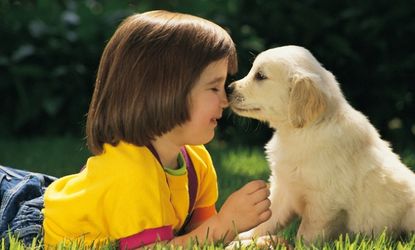How wolves evolved into man's best friend
Swedish scientists have identified a key piece of the canine evolutionary puzzle: The ability to process carbs

Implausible as it may seem, your harmless little maltipoo puppy descended from a fearsome line of bloodthirsty wolves. And thanks to a new discovery, scientists now have a better idea of how exactly that happened.
Comparing dog and wolf DNA, new research published in Nature suggests that dogs possess an evolved set of genes that help them more effectively break down carbs and starches than their ferocious, wild ancestors. It's why our cuddly pals are more likely to go for a dog biscuit than, well, our throats.
Combing through the genomes of 60 domestic breeds — including golden retrievers and cockerspaniels — Swedish researchers discovered that dogs have a much easier time converting starches into glucose than modern wolves. This means that at some point in dogs' evolutionary history, packs of wild canids struck up a mutually beneficial relationship with early humans, and learned to subsist on people food — stuff like wheat, barley, corn, rice, and potatoes. In exchange, man earned himself a loyal friend and fierce protector.
Subscribe to The Week
Escape your echo chamber. Get the facts behind the news, plus analysis from multiple perspectives.

Sign up for The Week's Free Newsletters
From our morning news briefing to a weekly Good News Newsletter, get the best of The Week delivered directly to your inbox.
From our morning news briefing to a weekly Good News Newsletter, get the best of The Week delivered directly to your inbox.
"I think it is a striking case of co-evolution," Erik Axelsson, a geneticist at Uppsala University, tells the Washington Post. "The fact that we shared a similar environment in the last 10,000 years caused a similar adaptation. And the big change in the environment was the development of agriculture."
But why did dogs and humans start hanging out in the first place? That's still a matter of contention. Some researchers think that early humans domesticated wolves they found skulking through the trash in village outskirts. Others think humans captured and raised wolf puppies early in their lives and that over time they and their offspring became tame.
Mark Derr, author of How the Dog Became the Dog, thinks wolves started following man around when our ancestors were still nomadic. The theory goes that wolves realized that these weapon-toting, bipedal hunters were very effective killing machines, and began following them, taking whatever scraps were left over from a big kill. (Scavenging consumes less energy than hunting, the thinking goes.) Eventually, a relationship was established, and these furry creatures began to travel with us, evolving smaller skeletal frames and shorter jaws over the centuries.
"You had populations of dog-wolves that became isolated, and in doing so, they began to inbreed," Derr tells NPR. "And when you inbreed, you get genetic peculiarities that arise, and then those peculiarities become part of the population. If they work or become popular or have some function of beauty or utility, then they were kept by the humans — and that population then spreads those through other populations through breeding."
Sign up for Today's Best Articles in your inbox
A free daily email with the biggest news stories of the day – and the best features from TheWeek.com
Create an account with the same email registered to your subscription to unlock access.
-
 The hunt for Planet Nine
The hunt for Planet NineUnder The Radar Researchers seeking the elusive Earth-like planet beyond Neptune are narrowing down their search
By Chas Newkey-Burden, The Week UK Published
-
 Magazine interactive crossword - April 26, 2024
Magazine interactive crossword - April 26, 2024Puzzles and Quizzes Issue - April 26, 2024
By The Week US Published
-
 Magazine solutions - April 26, 2024
Magazine solutions - April 26, 2024Puzzles and Quizzes Issue - April 26, 2024
By The Week US Published